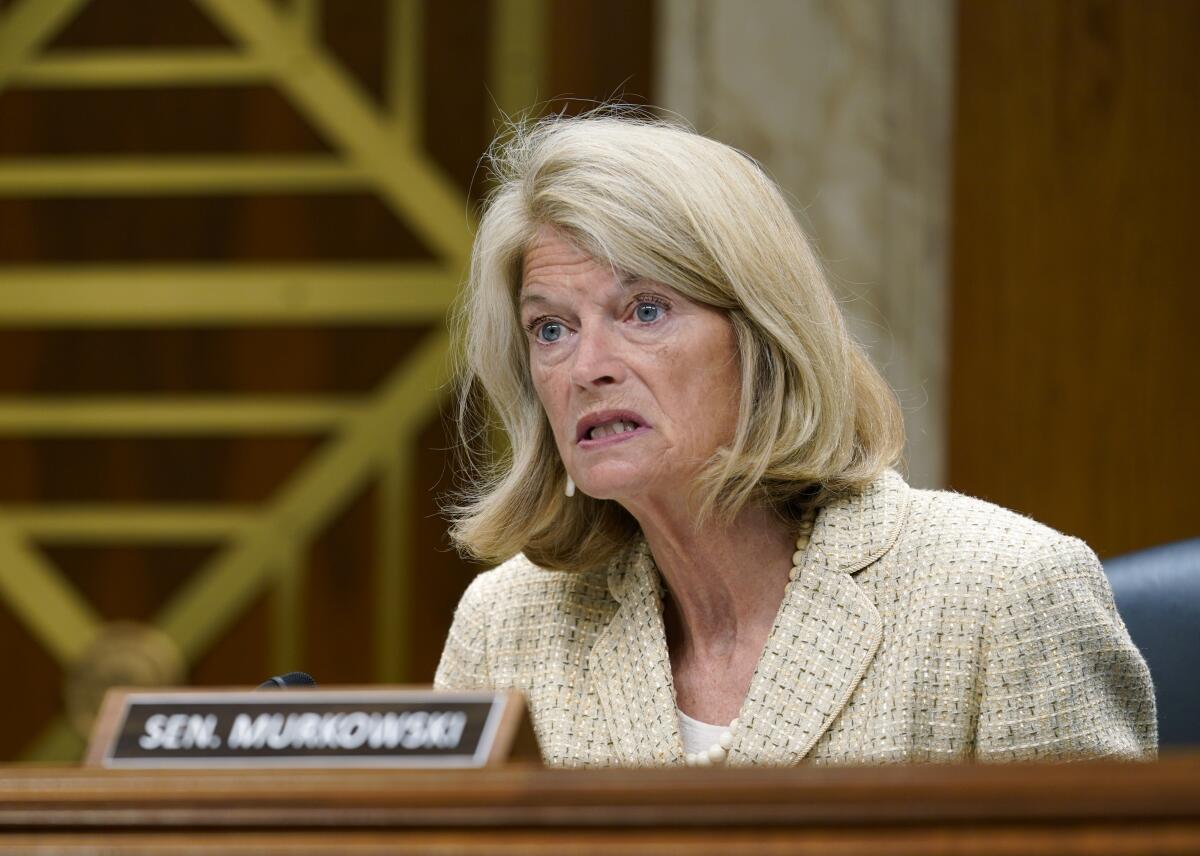Murkowski and Peltola win reelection in Alaska races

JUNEAU, Alaska — Republican Sen. Lisa Murkowski and Democratic Rep. Mary Peltola have both defeated Trump-backed challengers to win reelection in Alaska.
Murkowski beat GOP rival Kelly Tshibaka, who had former President Trump’s endorsement, in the Nov. 8 ranked-choice election. The results were announced Wednesday, after election officials tabulated the ranked results because neither candidate had won more than 50% of first-choice votes. Murkowski wound up with 54% after picking up a majority of the votes cast for Democrat Pat Chesbro, who was eliminated from the final count.
“I am honored that Alaskans — of all regions, backgrounds and party affiliations — have once again granted me their confidence to continue working with them and on their behalf in the U.S. Senate,” Murkowski said in a statement. “I look forward to continuing the important work ahead of us.”
Tshibaka congratulated Murkowski in a statement that also took issue with ranked-choice voting.
“The new election system has been frustrating to many Alaskans, because it was indisputably designed as an incumbent-protection program, and it clearly worked as intended,” she said.
The race had also included Republican Buzz Kelley, who suspended his campaign after the August primary and endorsed Tshibaka.
In Alaska’s lone U.S. House race, Democrat Peltola was elected to a full term, months after winning a special election for the seat vacated when longtime Republican Rep. Don Young died earlier this year.
Peltola defeated Republicans Sarah Palin and Nick Begich and Libertarian Chris Bye. Palin and Begich had also lost to her in the special election.
Peltola, who is Yup’ik, became the first Alaska Native in Congress and the first woman to hold Alaska’s House seat when she won in August. The win buoyed her fundraising, outpacing that of her rivals in the lead-up to this month’s midterm election.
Peltola embraced Young’s legacy as she campaigned for the two-year term. She was endorsed by his daughters, and one of them presented her with a bolo tie of Young’s at an Alaska Federation of Natives conference, where Peltola was treated like a rock star. Young held the seat for 49 years.
“Now I’m a real congressman for all Alaska,” she said. Young often referred to himself that way. Peltola has described his legacy as one of bipartisanship and building support for Alaska‘s interests in Congress.
A state lawmaker from the small rural hub of Bethel for 10 years, ending in 2009, Peltola surprised many with her fourth-place finish in the June special primary. She emerged from a field of 48 candidates that included current state and local-level officeholders. That finish was enough to send her to the special election.
Murkowski had faced a tough race as the only Senate Republican on the ballot this year who voted to convict Trump at his 2021 impeachment trial. Trump was not convicted, but Murkowski’s vote was a sore point for the former president, who vowed to campaign against her.
In 2020, before that year’s election and well before Tshibaka jumped into the Senate race, Trump announced plans to campaign against Murkowski: “Get any candidate ready, good or bad, I don’t care, I’m endorsing. If you have a pulse, I’m with you!”
In July, he appeared at an Anchorage rally for Tshibaka and Palin, whose run for Alaska’s House seat he also endorsed. Trump also participated in a tele-rally for Tshibaka in late October.
Tshibaka, who worked in federal inspectors general offices before leading the Alaska Department of Administration for two years, credited Trump with helping to raise her name recognition and give her candidacy a boost.
Murkowski, who was censured by state Republican Party leaders last year for offenses that included her impeachment vote, paid little attention to Trump during a campaign in which she emphasized a willingness to work across party lines and focused on her record and seniority. A moderate who has been in the Senate since 2002, she became the most senior member of Alaska’s congressional delegation when Young died in March.
Murkowski is experienced with tough reelection fights. She won a general election write-in campaign in 2010 after losing her party primary that year to a tea party Republican, and had never won a general election with more than 50% of the vote.
This year’s elections were held under a new system approved by voters in 2020 that replaced party primaries with open primaries and instituted ranked voting in general elections. Under the open primary system, the top four vote-getters, regardless of party affiliation, advance to the general election.
“Our Alaska U.S. Senate election turned out to be another victory for the Washington, D.C. insiders who rarely have our best interests at heart,” Tshibaka said in her postelection statement.
Tshibaka has also criticized a super PAC aligned with Senate Republican leader Mitch McConnell for running ads against her; she said those resources could have been used to help Republicans in other states.
She said she “ranked the red,” or the Republican candidates, on her ballot — but not in the Senate race. She said she did not consider Murkowski a “red” candidate.
“I didn’t vote for her either,” Murkowski said on election day.
Associated Press writer Mark Thiessen in Anchorage contributed to this report.
More to Read
Sign up for Essential California
The most important California stories and recommendations in your inbox every morning.
You may occasionally receive promotional content from the Los Angeles Times.










